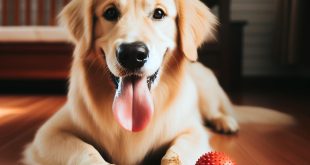Have you ever found yourself inexplicably awakened in the middle of the night, only to discover your four-legged friend softly howling in their sleep? Many dog owners have encountered this curious phenomenon and wondered why their beloved companions engage in such vocal displays during their slumber. While it may seem slightly eerie, there’s no need to worry! Dogs howling in their sleep is a natural behavior rooted in their ancestral heritage and is often seen as a harmless expression of instinctual communication. In this article, we will delve into the reasons behind this peculiar behavior, shedding light on why our canine pals may serenade us with nocturnal lullabies.
Table of Contents
1. The Nature of Canine Sleep
Dogs, our beloved furry companions, exhibit a wide range of behaviors while they sleep. Similar to humans, dogs experience different stages of sleep, namely non-REM and REM sleep. Understanding the nature of canine sleep helps shed light on why dogs howl during this seemingly peaceful slumber.
During non-REM sleep, dogs enter a deep sleep state where their body relaxes, and their heart rate slows down. This phase allows their bodies to recharge and heal. On the other hand, REM sleep is an active stage where dreams occur. It is in this stage that dogs may exhibit physiological responses, including howling.
2. Howling as an Instinctual Behavior
Howling is deeply rooted in a dog’s ancestral DNA and is believed to have originated from wolves, their wild cousins. Wolves, known for their keen vocal communication skills, often howl to communicate with their pack members across vast distances. Dogs have retained this instinctual behavior, even if domestication has altered their social structures.
While dreaming, dogs may feel the instinctual need to howl, as it may be a reflection of their genetic predisposition to communicate with others. Although we cannot be certain about the content of their dreams, this behavior may serve as a way for dogs to express their emotions or communicate their presence.
3. Sensory Triggers in Dreams
Just like humans, dogs can also experience vivid dreams. Environmental stimuli, such as sounds and smells, can influence the content of their dreams and trigger different reactions, including howling. For instance, a dog sleeping near an open window may be more likely to howl if they hear sirens or other loud sounds in their slumber.
These sensory triggers can evoke automatic responses, leading to vocalizations in the form of howling. It is essential to note that howling during sleep does not necessarily indicate distress, but rather reflects the dog’s response to external stimuli encountered within their dreams.
4. Dreams as Emotional Outlets
Consider dreams as a dog’s personal emotional outlet. Just as humans may talk or even cry during sleep, dogs can also express themselves through howling. It is believed that during REM sleep, dogs may experience vivid dreams that mirror their waking life experiences.
Howling during these dreams might reflect the emotional state the dog is experiencing while asleep. It is not uncommon for dogs to howl if they are missing a loved one, feeling anxious, or even excited. Their howls serve as an emotional release, allowing them to express their innermost feelings.
5. Breed Predispositions
Different dog breeds may have varying tendencies to howl during their sleep. Certain breeds with a strong working or hunting heritage may be more prone to vocalize, even during their slumber. Breeds like Huskies, Malamutes, and Beagles, for example, are known for their extensive use of vocalizations in hunting or sledding activities.
While it is difficult to pinpoint precisely why certain breeds howl more often during sleep, it may be related to their genetic makeup and the development of their communication skills. Their instinctual traits can manifest even in their dreams, resulting in sleep howling specific to their breed.
6. Manifestation of Anxiety
In some cases, howling during sleep may indicate underlying anxiety or other emotional distress in dogs. Dogs that experience separation anxiety or have gone through traumatic experiences may exhibit increased howling during sleep.
It is crucial to differentiate between instinctual howling and potential distress-related howling. If your dog consistently appears distressed while howling during sleep or displays other signs of anxiety, consulting with a veterinarian or professional dog behaviorist may be beneficial.
7. Age and Developmental Factors
The age and developmental stage of a dog can also play a role in howling during sleep. Puppies, for example, may be more likely to howl during their sleep as their brains and senses develop. This behavior is akin to human babies who may make noise or cry while sleeping.
As puppies grow and mature, their sleeping patterns and tendencies may change. The howling observed during their early stages of development may diminish or stop altogether. Understanding the age-related factors can provide insights into why dogs howl during sleep and help pet parents address any concerns.
8. Environmental Factors
The environment in which a dog sleeps can significantly impact their dream content and subsequent howling. Dogs are highly attuned to their surroundings and may react to external noises or disturbances during their sleep, leading to sleep howling.
If your dog is consistently disturbed by outside noises, such as construction sounds or neighbors, providing a quieter sleeping area or using background noise machines may help reduce their howling during sleep. Creating a peaceful sleeping environment can enhance the quality of your dog’s sleep and potentially diminish sleep howling.
9. Observing Sleep Behavior
As responsible dog owners, observing and understanding our furry friends’ sleep behavior is crucial. Paying attention to the frequency, duration, and associated factors of sleep howling can offer valuable insights into the motivations behind this behavior.
Keep a sleep journal to track when your dog howls during sleep, the environment in which it occurs, and any potential triggers or stressors. By identifying patterns, you can make informed decisions about how to address or manage sleep howling effectively, ensuring your pup has restful slumbers.
10. Seek Professional Advice
If you have concerns about your dog’s sleep howling or suspect an underlying issue, do not hesitate to seek professional advice. Consulting with a veterinarian or dog behavior specialist can help address any potential medical or behavioral aspects contributing to this behavior.
Remember, sleep howling is a natural behavior for canines and is often harmless. However, providing a safe and comfortable sleep environment and addressing any potential distress or anxiety will help ensure your furry friend has well-deserved sweet dreams.
Reasons why dogs howl in their sleep
Many dog owners have experienced the strange phenomenon of their furry friend howling in their sleep. This adorable and sometimes eerie behavior can leave pet owners puzzled, wondering why dogs howl while they rest peacefully. While it may seem mysterious and even spooky, there are several reasons why dogs howl in their sleep. In this section, we will explore the different factors that contribute to this intriguing behavior.
1. Instinctual Nature
Dogs are descendants of wolves, who communicate through howling. The ancestral instinct to howl has been passed down through generations, and it is a part of their inherent nature. Even though dogs have been domesticated and adapted to living with humans, their primal instincts resurface during their sleep.
2. Dreaming and Sleep-Wake Cycles
Similar to humans, dogs go through different sleep stages, including deep sleep and REM (Rapid Eye Movement) sleep, which is associated with dreaming. During REM sleep, dogs may twitch, move, vocalize, and even howl due to the vividness of their dreams. It is believed that these dreams might trigger their instinct to howl, leading to unique vocalizations during sleep.
3. Communication and Social Bonding
Dogs are highly social animals that rely on communication to convey information to their pack. Howling serves as a means of long-distance communication, allowing dogs to connect with other canines or even their human family members. While asleep, dogs may engage in this vocal behavior unknowingly, attempting to communicate with their pack members.
4. Separation Anxiety
Sometimes, dogs may howl in their sleep due to separation anxiety. This condition occurs when dogs feel distressed or anxious when separated from their owners. During sleep, their subconscious mind might replay feelings of separation anxiety, leading to vocalization such as howling.
5. External Stimuli
Dogs have keen senses and can be deeply affected by external stimuli, even while asleep. Noises from outside, such as sirens, other animals, or even the sound of other dogs howling nearby, can trigger a response in sleeping dogs. This can lead to them howling as a reaction to these stimuli, even if they are not fully awake.
6. Health Issues
In some cases, dogs may howl in their sleep due to underlying health issues, such as pain or discomfort. Conditions like arthritis, dental problems, or even certain neurological disorders can cause dogs to engage in vocalizations during sleep. If you notice excessive howling or any other concerning behavior, it is important to consult with a veterinarian.
7. Age and Development
Young puppies, especially during their crucial developmental stages, may howl more frequently during sleep. This can be attributed to their growing awareness of the world and their attempt to vocalize and communicate. As puppies mature, they typically outgrow this behavior over time.
8. Breed Characteristics
Some dog breeds are more prone to howling than others. Certain breeds, such as Huskies and Alaskan Malamutes, have inherited their ancestors’ vocal nature and are known for their tendency to howl. During sleep, these breeds might continue to express their inherited behavior, resulting in howling.
9. Environmental Factors
The environment in which a dog sleeps can also influence their howling during slumber. Dogs that are kept in households with other vocal dogs or in areas where they can hear howling from nearby dogs are more likely to join in with their own howls during sleep as a response to the surrounding noises.
10. Emotional Expression
Dogs, just like humans, have emotions that they express through various behaviors. Howling during sleep can be a way for dogs to release stress, anxiety, or excitement they experienced during the day. It can serve as a form of emotional expression, allowing them to unwind and process their feelings even during sleep.
In conclusion, dogs howl in their sleep due to a combination of instinctual nature, dreaming, communication, separation anxiety, external stimuli, health issues, age and development, breed characteristics, environmental factors, and emotional expression. While it may seem peculiar, this behavior is often a natural part of a dog’s sleep cycle. As pet owners, it is important to observe and understand our furry companions, ensuring their well-being and providing appropriate care when needed.
Reasons for Dogs Howling in Their Sleep
When it comes to understanding why dogs howl in their sleep, there are several factors that can contribute to this behavior. Let’s delve into the reasons behind why dogs howl during their slumber:
1. Instinctual Behavior
Dogs are descended from wolves, and howling is a deeply ingrained instinct in their genetic makeup. Even domesticated dogs often retain this primal behavior. While some may perceive it as a nuisance, it is important to remember that howling is a natural way for dogs to communicate with each other.
During sleep, canines may experience vivid dreams, triggering their instinctual behaviors. As they howl, your pup may be reliving their ancestral instincts, running with a pack or responding to unseen stimuli in their dreams.
2. Vocalizing Dreams
Similar to humans talking or laughing during sleep, dogs can vocalize their dreams through howling. This natural expression of their dream experience can vary from dog to dog. Some may let out short and soft howls, while others may have more intense and prolonged vocalizations.
It’s essential to remember that howling during sleep doesn’t necessarily indicate distress or discomfort. Often, it simply reflects the heightened level of brain activity during the REM (Rapid Eye Movement) sleep phase, when dreams occur.
3. Medical Conditions
Dogs experiencing certain medical conditions, such as cognitive dysfunction syndrome (CDS), may be prone to howling during sleep. CDS is similar to Alzheimer’s disease in humans and can lead to disrupted sleeping patterns, including more frequent dreams or nightmares. If you observe consistent and distressing howling in your dog’s sleep, it’s advisable to consult a veterinarian.
In addition to CDS, other medical conditions or medications might also contribute to increased howling during sleep. Some medications can affect sleep quality or induce vivid dreams, leading to vocalizations during slumber.
4. Separation Anxiety
Dogs suffering from separation anxiety may also howl in their sleep. The feeling of loneliness experienced during periods of separation can carry over to their dreams. Dogs with separation anxiety may howl more often or intensely during sleep as a manifestation of their distress when separated from their beloved humans.
If your dog displays signs of separation anxiety during waking hours, such as excessive barking or destructive behavior when left alone, it is essential to address the underlying issue and seek professional help or training techniques to alleviate their anxiety.
5. Environmental Triggers or Stimuli
Dogs have heightened senses, and they can detect sounds or vibrations that humans might not notice. During sleep, external noises or stimuli can trigger howling in dogs, even if they are not fully awake. These triggers can be anything from a distant siren to the howling of other dogs.
If your dog’s sleep howling seems to be triggered by specific noises or events in their environment, it may be helpful to create a calm and quiet sleeping space for them. Using white noise machines or providing a comforting crate can help minimize external stimuli that may disrupt their sleep and trigger howling.
| Medical Conditions | Symptoms |
|---|---|
| Cognitive Dysfunction Syndrome (CDS) | – Disrupted sleeping patterns – Frequent dreams or nightmares |
| Other medical conditions or medications | – Sleep disturbances – Vivid dreams |
Thank You for Joining Us on the Mysterious Journey of Dog Howling in Their Sleep
We are incredibly grateful for your curiosity and desire to delve into the whimsical world of our furry companions. The enigmatic nocturnal serenades of dogs continue to captivate us, leaving us with more questions than answers. Although we may never fully comprehend why they howl in their sleep, one thing is certain – the bond between humans and dogs is truly magical. We hope this article has brought you joy and a deeper understanding of our four-legged friends’ extraordinary behaviors. Thank you for embarking on this adventure with us today, and we eagerly await your return to uncover more secrets of the canine realm. Until next time, take care, and may your dreams be filled with the melodic sounds of these sweet slumbering howlers.
 Treat For Dog – Brain Training for Dogs, Dog Training & Obedience Discover Treat For Dog and get your pup on the path to smarter, happier, and healthier living with brain training for dogs.
Treat For Dog – Brain Training for Dogs, Dog Training & Obedience Discover Treat For Dog and get your pup on the path to smarter, happier, and healthier living with brain training for dogs.



